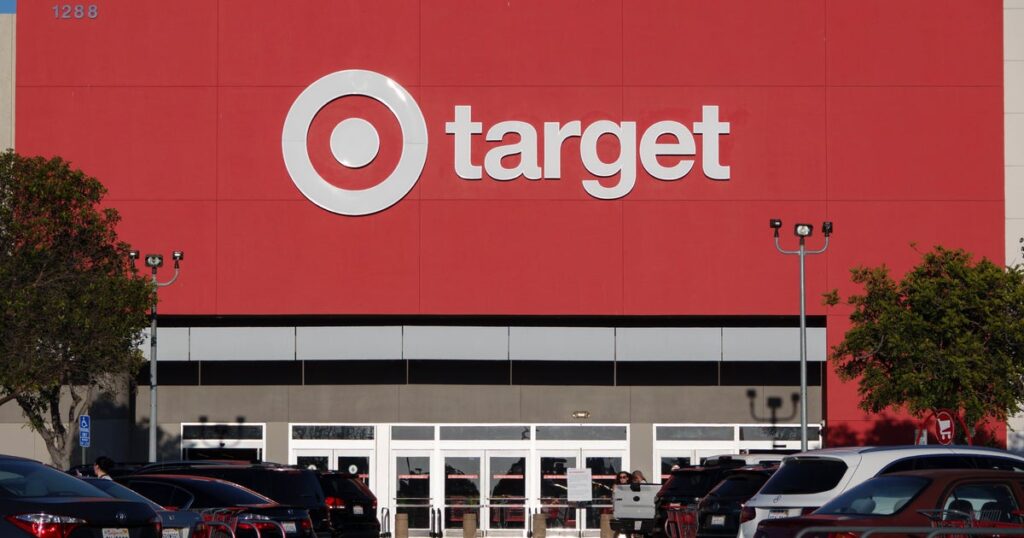For Kryztal Peña, a Target run used to be her weekly ritual.
Peña, a Chicago-based hospital researcher and mom of two young children, loved going to the store as her “stress coping mechanism” to walk the aisles, buy diapers and get her family out of the house.
But since February, she has not done her shopping there. After Donald Trump got re-elected, Target, one of the nation’s largest retailers, said in January that it would end the diversity, equity and inclusion (DEI) goals it had made to hire and promote more women and people of color, as well as to recruit more diverse suppliers to stay “in step with the evolving external landscape,” according to a company memo sent to employees.
Peña saw social media posts about the “Latino Freeze” to protest Target’s actions and decided to follow suit by boycotting the store. The first two weeks were hard. “I definitely did miss it, but it is what it is,” she said. But she has since created new habits.
Now, when Peña is low on diapers, she shops at Costco, a brand that has won praise for continuing to honor DEI principles when many companies have rolled theirs back. Peña said it would take much more than an apology at this point to get her to go back to Target.
“A statement now ― it’s too far gone,” she said. “It would take a big push where you’re actually trying to reach out to Black and brown small businesses, and trying to incorporate them into your business again.“
Peña is one of the many people who are joining boycott movements led by Black and Latine organizers against the retailer due to its decision to end DEI programs.
And it might actually be working.
When Organizers Join Forces, A Boycott Gets Stronger.
One-day, no-shopping pledges like the “economic blackout” earlier this year can face criticism for being more symbolic than effective. But a long-term boycott of a store can actually spark lasting change.
Nina Turner leads a labor advocacy group called We Are Somebody and is one of the organizers calling for an indefinite boycott of Target. Turner said one of her reasons for starting her group’s boycott was because Target “lied to the Black community,” pointing to CEO Brian Cornell’s statements after George Floyd’s murder.
After Floyd was murdered by police near Target’s headquarters in 2020, Cornell said that Floyd “could have been one of my Target team members.” In the months after Floyd’s death, Target pledged to increase its Black workforce by 20% and to dedicate $10 million toward “advancing social justice.”
But just a few years later, Target walked back this pledge when it ended its DEI initiatives in January.
“Target, more than other companies … made a specific promise to the Black community, and then they bent to bigotry,” Turner said.
After Target’s DEI rollback this year, Turner joined forces with an Atlanta-area pastor, the Rev. Jamal Bryant, and activist Tamika Mallory to popularize a 40-day Target “fast” to coincide with the Christian observance of Lent. Right before Easter, the three leaders met with a Target executive to see if Target would “do the right thing,” Turner said, and restore its commitments to the Black community, invest in Black businesses and not penalize its workers.
But they left the meeting with Target feeling as though nothing would change. So the three are now calling on customers to boycott all Target stores indefinitely.
Target disputes that it has dropped its commitment to inclusion.
Justin Sullivan via Getty Images
“At Target, we have an ongoing commitment to creating a welcoming environment for all team members, guests, and suppliers. It’s core to how we support and grow our business,” a Target spokesperson told HuffPost when asked about the claims of Target caving to bigotry. “We remain focused on supporting organizations and creating opportunities for people in the 2,000 communities where we live and operate.”
But until Target changes its DEI policies, boycotts like these will continue.
“The Black community is serious about this boycott, and it’s going to continue. We’re building a Black-brown coalition as we go,” Turner said.
Pediatric surgeon Dr. Michael Galvez is one of the co-organizers of the “Latino Freeze” movement that is urging Latines to take advantage of their purchasing power and redirect it toward brands that support DEI. Galvez said the “Latino Freeze” boycott of Target was, in part, inspired by Turner’s work: “I don’t want to buy at Target if they’ve stopped all these initiatives,” he said.
And the more groups that boycott Target, the stronger this movement becomes.
Trevon Logan, a professor of economics at Ohio State University, said that a “coordinated response” from multiple groups like the ones led by Black clergy, civil rights leaders and the “Latino freeze” organizers can make a difference because it “reflects a strategy that is focused and could serve as a signal to other retailers in this space.”
Target Is Seeing Lower Foot Traffic Since The Boycott.
When Turner first launched a boycott of Target earlier this year, it coincided with Black History Month. During that time, Target’s foot traffic went down 6.5% compared to its year-over-year performance, while Costco’s shot up 7.5%.
Turner said Target’s CEO Cornell has now “found out” what happens when you dismiss “the power of the Black dollar and the power of Black people’s commitment to not be taken advantage by corporations like him.”
Foot traffic at Target stores, in general, has dropped for 11 straight weeks, according to Placer.ai, while foot traffic at Costco has been steadily increasing over the past 16 weeks. Target did not respond to questions about whether a reported drop in foot traffic can be linked to its decision to end DEI programs.
“We will have to see what the first and second quarter results are, but foot traffic is a real-time indicator of consumer response,” Logan said, noting the importance of Costco, which continues to defend DEI, seeing its foot traffic increase.
Beyond foot traffic, retailers also pay attention to brand loyalty ― and that can be one of the biggest strengths of a months-long boycott. The longer people go without shopping at Target, the more likely they are to realize they don’t need to shop there ever again.
“It can be difficult to win back a customer who has become disaffected,” Logan said. “If consumption patterns change and consumers settle into a new pattern, it becomes less about the boycott and much more about how the firm can attract new customers and old customers.”
Galvez said it would take a major public apology from Target and reinvestment in racial minority groups and LGBTQ+ communities for him to consider shopping at Target again.
But for now, he won’t. “This could be generational,” Galvez said. “I’m teaching my kids: ‘We don’t go to Target anymore.’”
Read the full article here








